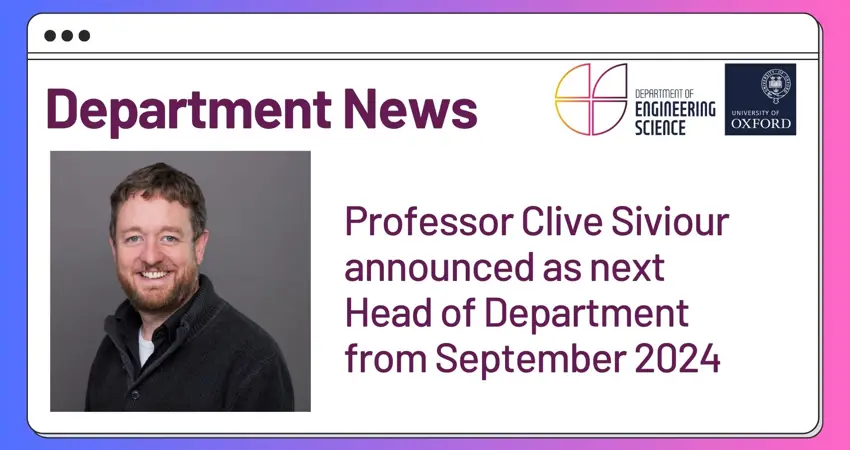20 Jun 2024
Engineering Science announces Professor Clive Siviour as next Head of Department
During his five year term Professor Siviour will focus on new buildings and curriculum development to support the Department’s ambitious plans for teaching and research, along with ensuring career opportunities for all staff

The Department of Engineering Science is delighted to announce that Professor Clive Siviour will take over as Head of Department when Professor Ron Roy steps down in September 2024.
Professor Siviour says, “Investment in places and people over the next 5 to 10 years will be key to the success of our department for the rest of this century, ensuring that our research and education addresses current and future global challenges. During my time in Oxford, I am fortunate to have worked with four Heads who have each used their unique skills and interests to make the department an excellent place to work. We have a unique opportunity to build on this through a series of new buildings, the design of which must go hand-in-hand with development of the people and academic vision that are at the core of our activities. I am very much looking forward to leading the department during this exciting period of change”.
Professor Siviour joined the Department of Engineering Science in 2005, initially as a Career Development Fellowship, where he also taught at St Hilda’s College, and then, from 2008, as an Associate Professor and Tutorial Fellow at Pembroke College. Prior to this, he completed his first degree and PhD in the Department of Physics, University of Cambridge, where he performed research into the mechanical properties of materials under impact loading.
Clive’s research focuses on mechanical properties of materials when they are deformed at high speeds, such as occurs during impact loading. This has involved the integration of novel loading and analysis techniques, including a strong interest in quantitative analysis of images obtained using high speed (or slow motion) cameras. He has a particular expertise in impact response of polymers, from engineering plastics to very soft rubbers, and his research has enabled the development of novel constitutive models for these materials. He is also interested in developing techniques for aerospace materials, such as nickel, tungsten and ceramics, much of this work being performed in collaboration with Rolls-Royce.
Clive has sat on the Governing Body of Dymat, the European Association for Research into Dynamic Properties of Materials. In 2016, in recognition of Early Career contributions to Experimental Mechanics, he was invited to give the JSA Young Investigator Lecture at the Annual Meeting of the Society for Experimental Mechanics. He is currently Associate Editor of Strain and sits on the Editorial Board of International Journal of Impact Engineering.
In addition to his research, Clive teaches topics in Mechanical and Materials Engineering, such as structures, dynamics and vibrations, polymers, ceramics and Impact Engineering. He spent four years as Dean in Pembroke College.
Over the past five years, Clive has been actively involved in departmental governance, initially as Associate Head for Infrastructure, and more recently leading the development of the department’s strategy for new buildings.
Professor Roy says, "Clive Siviour is going to be a great Head of Department. He has the requisite insight, selflessness, attentiveness, patience, and bandwidth to lead a large and intellectually diverse department. His institutional knowledge will enable him to hit the ground running and his familiarity with our estates strategy will facilitate execution of the plan. The department will be in very good hands."
Key priorities for the next five years will be to establish a clear programme for new buildings that enable the Department’s ambitious plans for teaching and research, to ensure that our curriculum remains at the cutting edge of undergraduate and graduate education, and to strengthen support for career development of all of our employees.
Deputy Head of Department Professor Martin Booth, who led the recruitment process for the new Head of Department, says, “I am looking forward to working with Clive and the rest of the department over the next five years to enhance further our achievements in delivering world-class teaching and research”.




